Safeguarding the Welfare of Children and Young People Report
VerifiedAdded on 2023/01/06
|18
|5383
|2
Report
AI Summary
This report, focusing on safeguarding the welfare of children and young people, provides a detailed overview of various aspects within the education sector. It begins by defining safeguarding and child welfare and then delves into the provisions for early years education, detailing different types of childcare settings and their characteristics. The report then examines the characteristics of different school types across various educational stages, followed by an exploration of post-16 options for young people and adults. It also outlines the strategic purpose of schools, the roles and responsibilities of different staff members, and the roles of external professionals who may work with a school. The report further explores how a school's ethos, mission, aims, and values are reflected in working practices and communicated. It covers relevant laws, codes of practice, and how legislation affects school operations. The roles of regulatory bodies are also discussed. The report then examines the importance of school policies and procedures, their development, and communication. Finally, it addresses the roles and responsibilities of national and local government for education policy and the roles of schools and other organizations working with children. The report concludes by providing a comprehensive understanding of child welfare within educational contexts.
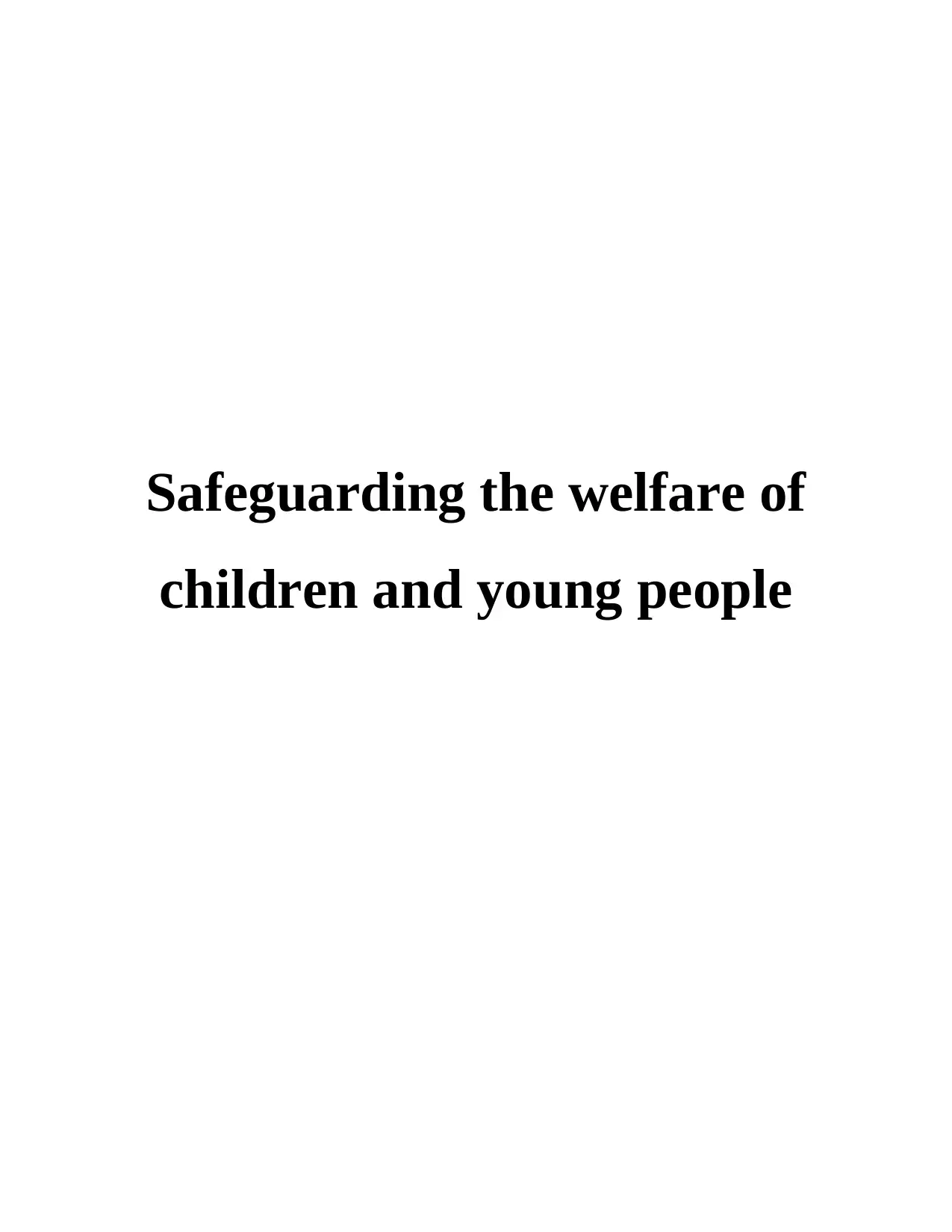
Safeguarding the welfare of
children and young people
children and young people
Paraphrase This Document
Need a fresh take? Get an instant paraphrase of this document with our AI Paraphraser
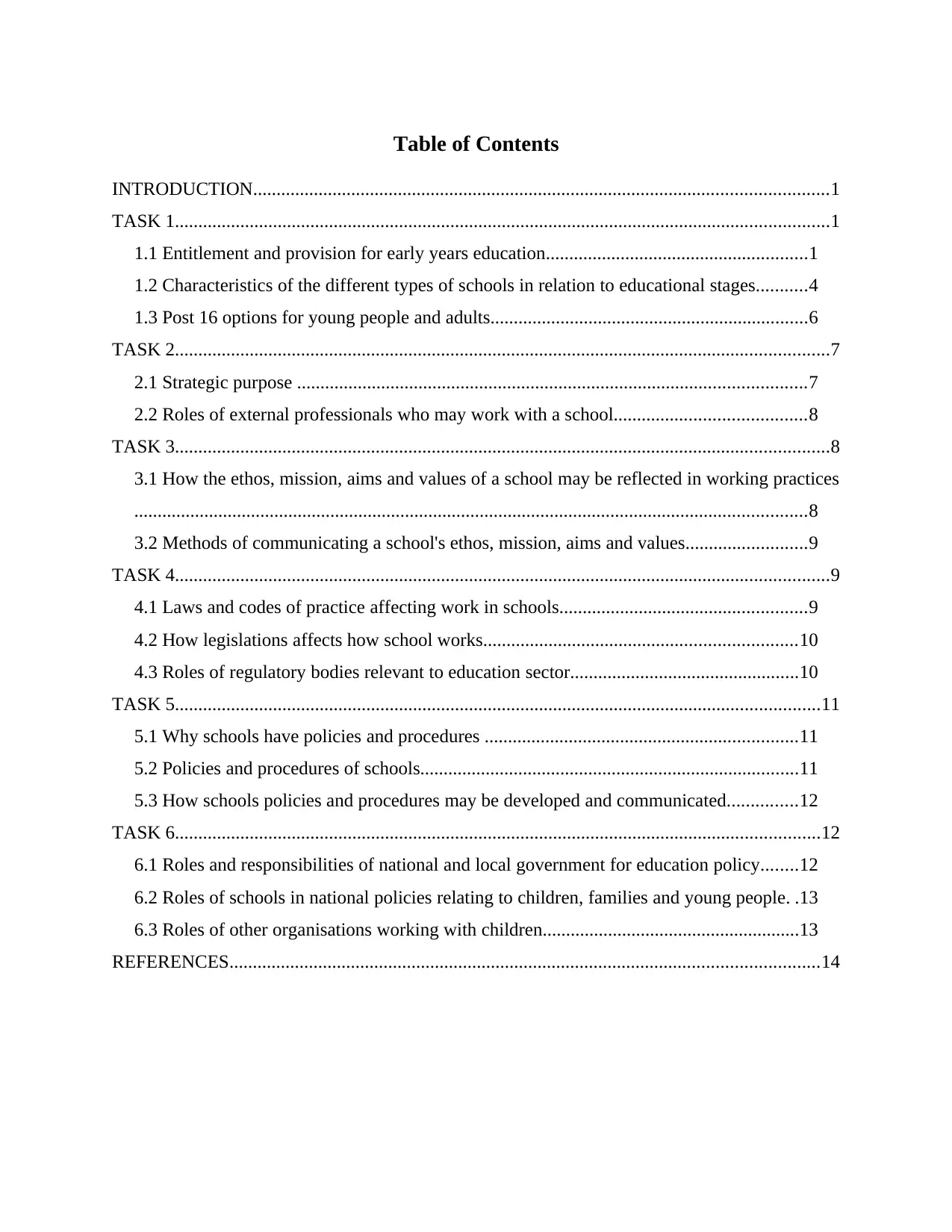
Table of Contents
INTRODUCTION...........................................................................................................................1
TASK 1............................................................................................................................................1
1.1 Entitlement and provision for early years education........................................................1
1.2 Characteristics of the different types of schools in relation to educational stages...........4
1.3 Post 16 options for young people and adults....................................................................6
TASK 2............................................................................................................................................7
2.1 Strategic purpose .............................................................................................................7
2.2 Roles of external professionals who may work with a school.........................................8
TASK 3............................................................................................................................................8
3.1 How the ethos, mission, aims and values of a school may be reflected in working practices
................................................................................................................................................8
3.2 Methods of communicating a school's ethos, mission, aims and values..........................9
TASK 4............................................................................................................................................9
4.1 Laws and codes of practice affecting work in schools.....................................................9
4.2 How legislations affects how school works...................................................................10
4.3 Roles of regulatory bodies relevant to education sector.................................................10
TASK 5..........................................................................................................................................11
5.1 Why schools have policies and procedures ...................................................................11
5.2 Policies and procedures of schools.................................................................................11
5.3 How schools policies and procedures may be developed and communicated...............12
TASK 6..........................................................................................................................................12
6.1 Roles and responsibilities of national and local government for education policy........12
6.2 Roles of schools in national policies relating to children, families and young people. .13
6.3 Roles of other organisations working with children.......................................................13
REFERENCES..............................................................................................................................14
INTRODUCTION...........................................................................................................................1
TASK 1............................................................................................................................................1
1.1 Entitlement and provision for early years education........................................................1
1.2 Characteristics of the different types of schools in relation to educational stages...........4
1.3 Post 16 options for young people and adults....................................................................6
TASK 2............................................................................................................................................7
2.1 Strategic purpose .............................................................................................................7
2.2 Roles of external professionals who may work with a school.........................................8
TASK 3............................................................................................................................................8
3.1 How the ethos, mission, aims and values of a school may be reflected in working practices
................................................................................................................................................8
3.2 Methods of communicating a school's ethos, mission, aims and values..........................9
TASK 4............................................................................................................................................9
4.1 Laws and codes of practice affecting work in schools.....................................................9
4.2 How legislations affects how school works...................................................................10
4.3 Roles of regulatory bodies relevant to education sector.................................................10
TASK 5..........................................................................................................................................11
5.1 Why schools have policies and procedures ...................................................................11
5.2 Policies and procedures of schools.................................................................................11
5.3 How schools policies and procedures may be developed and communicated...............12
TASK 6..........................................................................................................................................12
6.1 Roles and responsibilities of national and local government for education policy........12
6.2 Roles of schools in national policies relating to children, families and young people. .13
6.3 Roles of other organisations working with children.......................................................13
REFERENCES..............................................................................................................................14
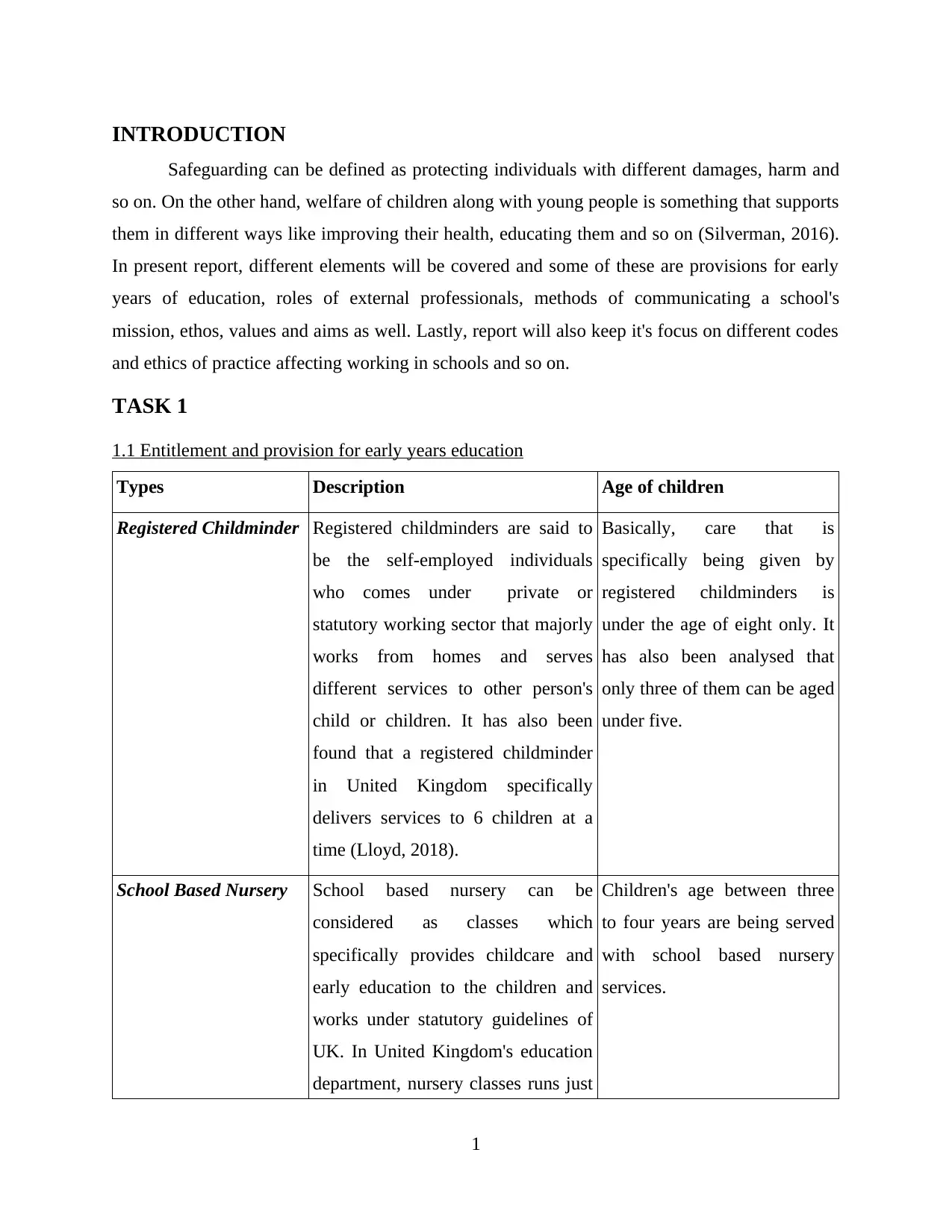
INTRODUCTION
Safeguarding can be defined as protecting individuals with different damages, harm and
so on. On the other hand, welfare of children along with young people is something that supports
them in different ways like improving their health, educating them and so on (Silverman, 2016).
In present report, different elements will be covered and some of these are provisions for early
years of education, roles of external professionals, methods of communicating a school's
mission, ethos, values and aims as well. Lastly, report will also keep it's focus on different codes
and ethics of practice affecting working in schools and so on.
TASK 1
1.1 Entitlement and provision for early years education
Types Description Age of children
Registered Childminder Registered childminders are said to
be the self-employed individuals
who comes under private or
statutory working sector that majorly
works from homes and serves
different services to other person's
child or children. It has also been
found that a registered childminder
in United Kingdom specifically
delivers services to 6 children at a
time (Lloyd, 2018).
Basically, care that is
specifically being given by
registered childminders is
under the age of eight only. It
has also been analysed that
only three of them can be aged
under five.
School Based Nursery School based nursery can be
considered as classes which
specifically provides childcare and
early education to the children and
works under statutory guidelines of
UK. In United Kingdom's education
department, nursery classes runs just
Children's age between three
to four years are being served
with school based nursery
services.
1
Safeguarding can be defined as protecting individuals with different damages, harm and
so on. On the other hand, welfare of children along with young people is something that supports
them in different ways like improving their health, educating them and so on (Silverman, 2016).
In present report, different elements will be covered and some of these are provisions for early
years of education, roles of external professionals, methods of communicating a school's
mission, ethos, values and aims as well. Lastly, report will also keep it's focus on different codes
and ethics of practice affecting working in schools and so on.
TASK 1
1.1 Entitlement and provision for early years education
Types Description Age of children
Registered Childminder Registered childminders are said to
be the self-employed individuals
who comes under private or
statutory working sector that majorly
works from homes and serves
different services to other person's
child or children. It has also been
found that a registered childminder
in United Kingdom specifically
delivers services to 6 children at a
time (Lloyd, 2018).
Basically, care that is
specifically being given by
registered childminders is
under the age of eight only. It
has also been analysed that
only three of them can be aged
under five.
School Based Nursery School based nursery can be
considered as classes which
specifically provides childcare and
early education to the children and
works under statutory guidelines of
UK. In United Kingdom's education
department, nursery classes runs just
Children's age between three
to four years are being served
with school based nursery
services.
1
⊘ This is a preview!⊘
Do you want full access?
Subscribe today to unlock all pages.

Trusted by 1+ million students worldwide
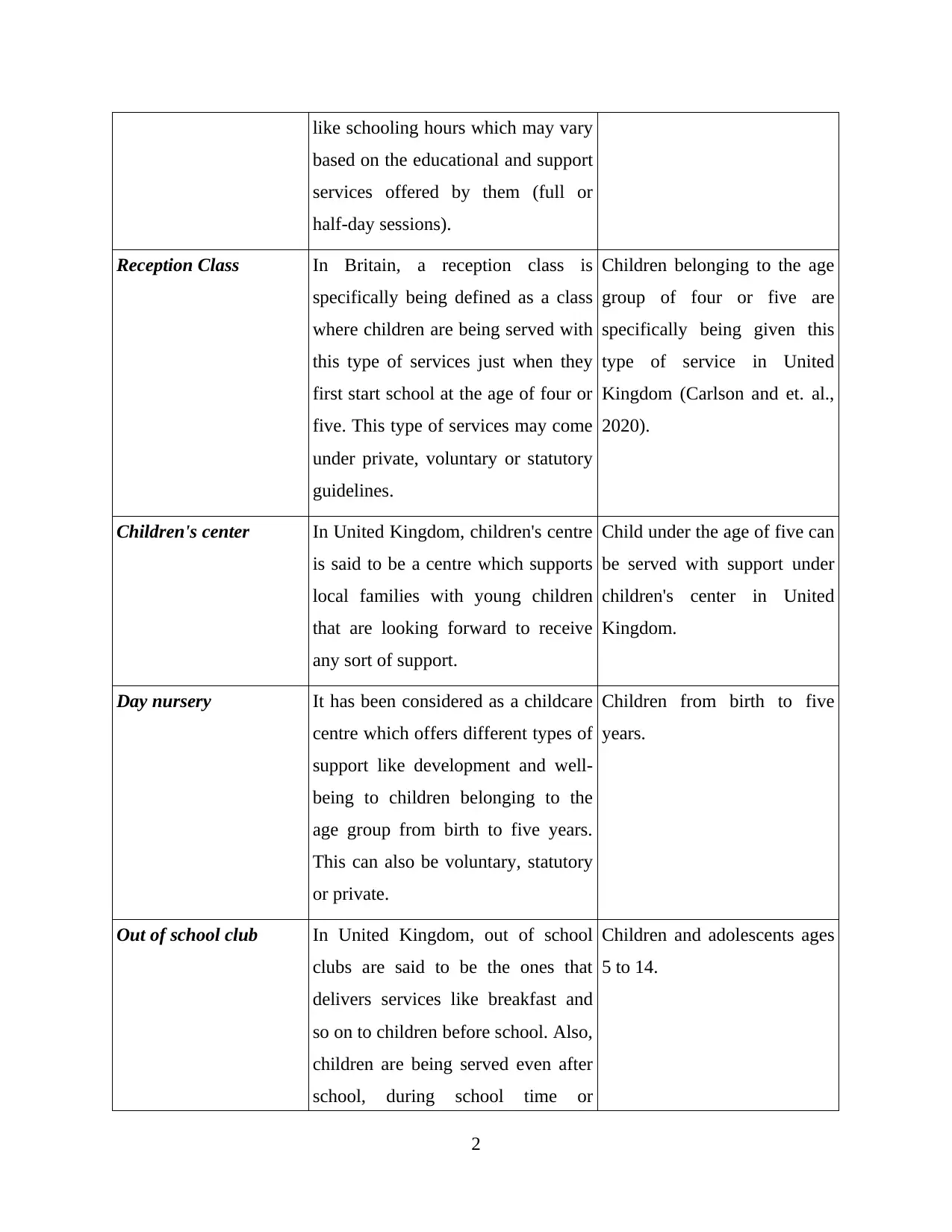
like schooling hours which may vary
based on the educational and support
services offered by them (full or
half-day sessions).
Reception Class In Britain, a reception class is
specifically being defined as a class
where children are being served with
this type of services just when they
first start school at the age of four or
five. This type of services may come
under private, voluntary or statutory
guidelines.
Children belonging to the age
group of four or five are
specifically being given this
type of service in United
Kingdom (Carlson and et. al.,
2020).
Children's center In United Kingdom, children's centre
is said to be a centre which supports
local families with young children
that are looking forward to receive
any sort of support.
Child under the age of five can
be served with support under
children's center in United
Kingdom.
Day nursery It has been considered as a childcare
centre which offers different types of
support like development and well-
being to children belonging to the
age group from birth to five years.
This can also be voluntary, statutory
or private.
Children from birth to five
years.
Out of school club In United Kingdom, out of school
clubs are said to be the ones that
delivers services like breakfast and
so on to children before school. Also,
children are being served even after
school, during school time or
Children and adolescents ages
5 to 14.
2
based on the educational and support
services offered by them (full or
half-day sessions).
Reception Class In Britain, a reception class is
specifically being defined as a class
where children are being served with
this type of services just when they
first start school at the age of four or
five. This type of services may come
under private, voluntary or statutory
guidelines.
Children belonging to the age
group of four or five are
specifically being given this
type of service in United
Kingdom (Carlson and et. al.,
2020).
Children's center In United Kingdom, children's centre
is said to be a centre which supports
local families with young children
that are looking forward to receive
any sort of support.
Child under the age of five can
be served with support under
children's center in United
Kingdom.
Day nursery It has been considered as a childcare
centre which offers different types of
support like development and well-
being to children belonging to the
age group from birth to five years.
This can also be voluntary, statutory
or private.
Children from birth to five
years.
Out of school club In United Kingdom, out of school
clubs are said to be the ones that
delivers services like breakfast and
so on to children before school. Also,
children are being served even after
school, during school time or
Children and adolescents ages
5 to 14.
2
Paraphrase This Document
Need a fresh take? Get an instant paraphrase of this document with our AI Paraphraser
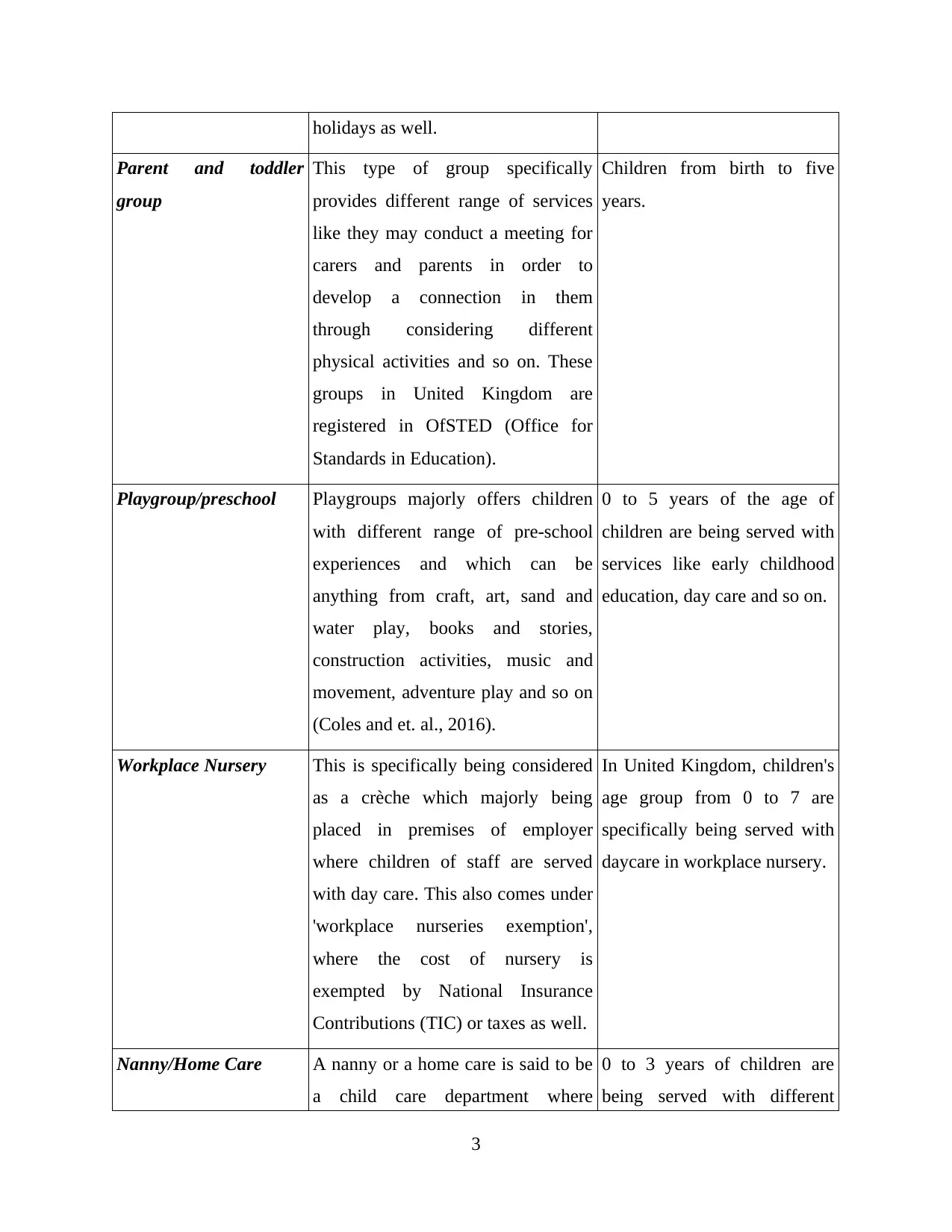
holidays as well.
Parent and toddler
group
This type of group specifically
provides different range of services
like they may conduct a meeting for
carers and parents in order to
develop a connection in them
through considering different
physical activities and so on. These
groups in United Kingdom are
registered in OfSTED (Office for
Standards in Education).
Children from birth to five
years.
Playgroup/preschool Playgroups majorly offers children
with different range of pre-school
experiences and which can be
anything from craft, art, sand and
water play, books and stories,
construction activities, music and
movement, adventure play and so on
(Coles and et. al., 2016).
0 to 5 years of the age of
children are being served with
services like early childhood
education, day care and so on.
Workplace Nursery This is specifically being considered
as a crèche which majorly being
placed in premises of employer
where children of staff are served
with day care. This also comes under
'workplace nurseries exemption',
where the cost of nursery is
exempted by National Insurance
Contributions (TIC) or taxes as well.
In United Kingdom, children's
age group from 0 to 7 are
specifically being served with
daycare in workplace nursery.
Nanny/Home Care A nanny or a home care is said to be
a child care department where
0 to 3 years of children are
being served with different
3
Parent and toddler
group
This type of group specifically
provides different range of services
like they may conduct a meeting for
carers and parents in order to
develop a connection in them
through considering different
physical activities and so on. These
groups in United Kingdom are
registered in OfSTED (Office for
Standards in Education).
Children from birth to five
years.
Playgroup/preschool Playgroups majorly offers children
with different range of pre-school
experiences and which can be
anything from craft, art, sand and
water play, books and stories,
construction activities, music and
movement, adventure play and so on
(Coles and et. al., 2016).
0 to 5 years of the age of
children are being served with
services like early childhood
education, day care and so on.
Workplace Nursery This is specifically being considered
as a crèche which majorly being
placed in premises of employer
where children of staff are served
with day care. This also comes under
'workplace nurseries exemption',
where the cost of nursery is
exempted by National Insurance
Contributions (TIC) or taxes as well.
In United Kingdom, children's
age group from 0 to 7 are
specifically being served with
daycare in workplace nursery.
Nanny/Home Care A nanny or a home care is said to be
a child care department where
0 to 3 years of children are
being served with different
3
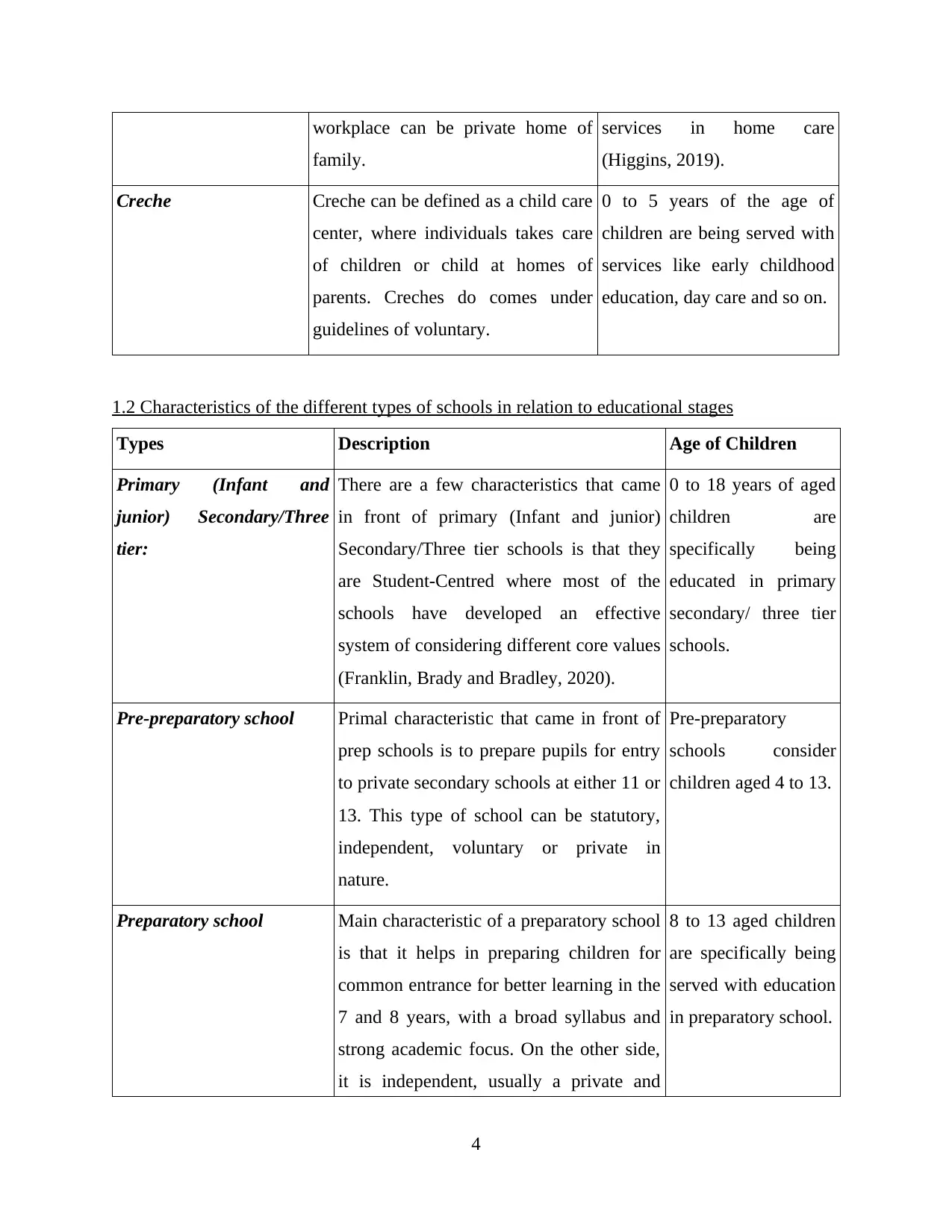
workplace can be private home of
family.
services in home care
(Higgins, 2019).
Creche Creche can be defined as a child care
center, where individuals takes care
of children or child at homes of
parents. Creches do comes under
guidelines of voluntary.
0 to 5 years of the age of
children are being served with
services like early childhood
education, day care and so on.
1.2 Characteristics of the different types of schools in relation to educational stages
Types Description Age of Children
Primary (Infant and
junior) Secondary/Three
tier:
There are a few characteristics that came
in front of primary (Infant and junior)
Secondary/Three tier schools is that they
are Student-Centred where most of the
schools have developed an effective
system of considering different core values
(Franklin, Brady and Bradley, 2020).
0 to 18 years of aged
children are
specifically being
educated in primary
secondary/ three tier
schools.
Pre-preparatory school Primal characteristic that came in front of
prep schools is to prepare pupils for entry
to private secondary schools at either 11 or
13. This type of school can be statutory,
independent, voluntary or private in
nature.
Pre-preparatory
schools consider
children aged 4 to 13.
Preparatory school Main characteristic of a preparatory school
is that it helps in preparing children for
common entrance for better learning in the
7 and 8 years, with a broad syllabus and
strong academic focus. On the other side,
it is independent, usually a private and
8 to 13 aged children
are specifically being
served with education
in preparatory school.
4
family.
services in home care
(Higgins, 2019).
Creche Creche can be defined as a child care
center, where individuals takes care
of children or child at homes of
parents. Creches do comes under
guidelines of voluntary.
0 to 5 years of the age of
children are being served with
services like early childhood
education, day care and so on.
1.2 Characteristics of the different types of schools in relation to educational stages
Types Description Age of Children
Primary (Infant and
junior) Secondary/Three
tier:
There are a few characteristics that came
in front of primary (Infant and junior)
Secondary/Three tier schools is that they
are Student-Centred where most of the
schools have developed an effective
system of considering different core values
(Franklin, Brady and Bradley, 2020).
0 to 18 years of aged
children are
specifically being
educated in primary
secondary/ three tier
schools.
Pre-preparatory school Primal characteristic that came in front of
prep schools is to prepare pupils for entry
to private secondary schools at either 11 or
13. This type of school can be statutory,
independent, voluntary or private in
nature.
Pre-preparatory
schools consider
children aged 4 to 13.
Preparatory school Main characteristic of a preparatory school
is that it helps in preparing children for
common entrance for better learning in the
7 and 8 years, with a broad syllabus and
strong academic focus. On the other side,
it is independent, usually a private and
8 to 13 aged children
are specifically being
served with education
in preparatory school.
4
⊘ This is a preview!⊘
Do you want full access?
Subscribe today to unlock all pages.

Trusted by 1+ million students worldwide
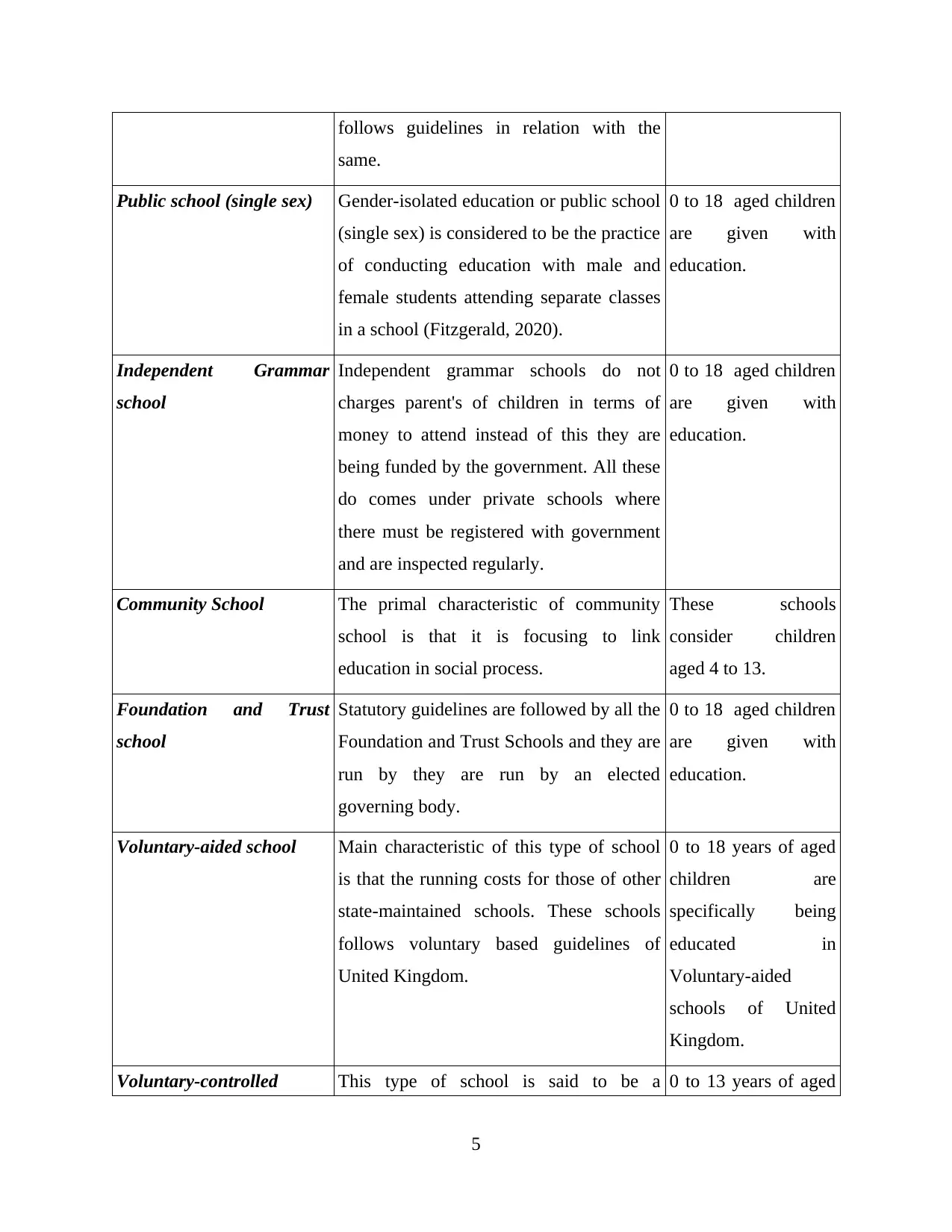
follows guidelines in relation with the
same.
Public school (single sex) Gender-isolated education or public school
(single sex) is considered to be the practice
of conducting education with male and
female students attending separate classes
in a school (Fitzgerald, 2020).
0 to 18 aged children
are given with
education.
Independent Grammar
school
Independent grammar schools do not
charges parent's of children in terms of
money to attend instead of this they are
being funded by the government. All these
do comes under private schools where
there must be registered with government
and are inspected regularly.
0 to 18 aged children
are given with
education.
Community School The primal characteristic of community
school is that it is focusing to link
education in social process.
These schools
consider children
aged 4 to 13.
Foundation and Trust
school
Statutory guidelines are followed by all the
Foundation and Trust Schools and they are
run by they are run by an elected
governing body.
0 to 18 aged children
are given with
education.
Voluntary-aided school Main characteristic of this type of school
is that the running costs for those of other
state-maintained schools. These schools
follows voluntary based guidelines of
United Kingdom.
0 to 18 years of aged
children are
specifically being
educated in
Voluntary-aided
schools of United
Kingdom.
Voluntary-controlled This type of school is said to be a 0 to 13 years of aged
5
same.
Public school (single sex) Gender-isolated education or public school
(single sex) is considered to be the practice
of conducting education with male and
female students attending separate classes
in a school (Fitzgerald, 2020).
0 to 18 aged children
are given with
education.
Independent Grammar
school
Independent grammar schools do not
charges parent's of children in terms of
money to attend instead of this they are
being funded by the government. All these
do comes under private schools where
there must be registered with government
and are inspected regularly.
0 to 18 aged children
are given with
education.
Community School The primal characteristic of community
school is that it is focusing to link
education in social process.
These schools
consider children
aged 4 to 13.
Foundation and Trust
school
Statutory guidelines are followed by all the
Foundation and Trust Schools and they are
run by they are run by an elected
governing body.
0 to 18 aged children
are given with
education.
Voluntary-aided school Main characteristic of this type of school
is that the running costs for those of other
state-maintained schools. These schools
follows voluntary based guidelines of
United Kingdom.
0 to 18 years of aged
children are
specifically being
educated in
Voluntary-aided
schools of United
Kingdom.
Voluntary-controlled This type of school is said to be a 0 to 13 years of aged
5
Paraphrase This Document
Need a fresh take? Get an instant paraphrase of this document with our AI Paraphraser
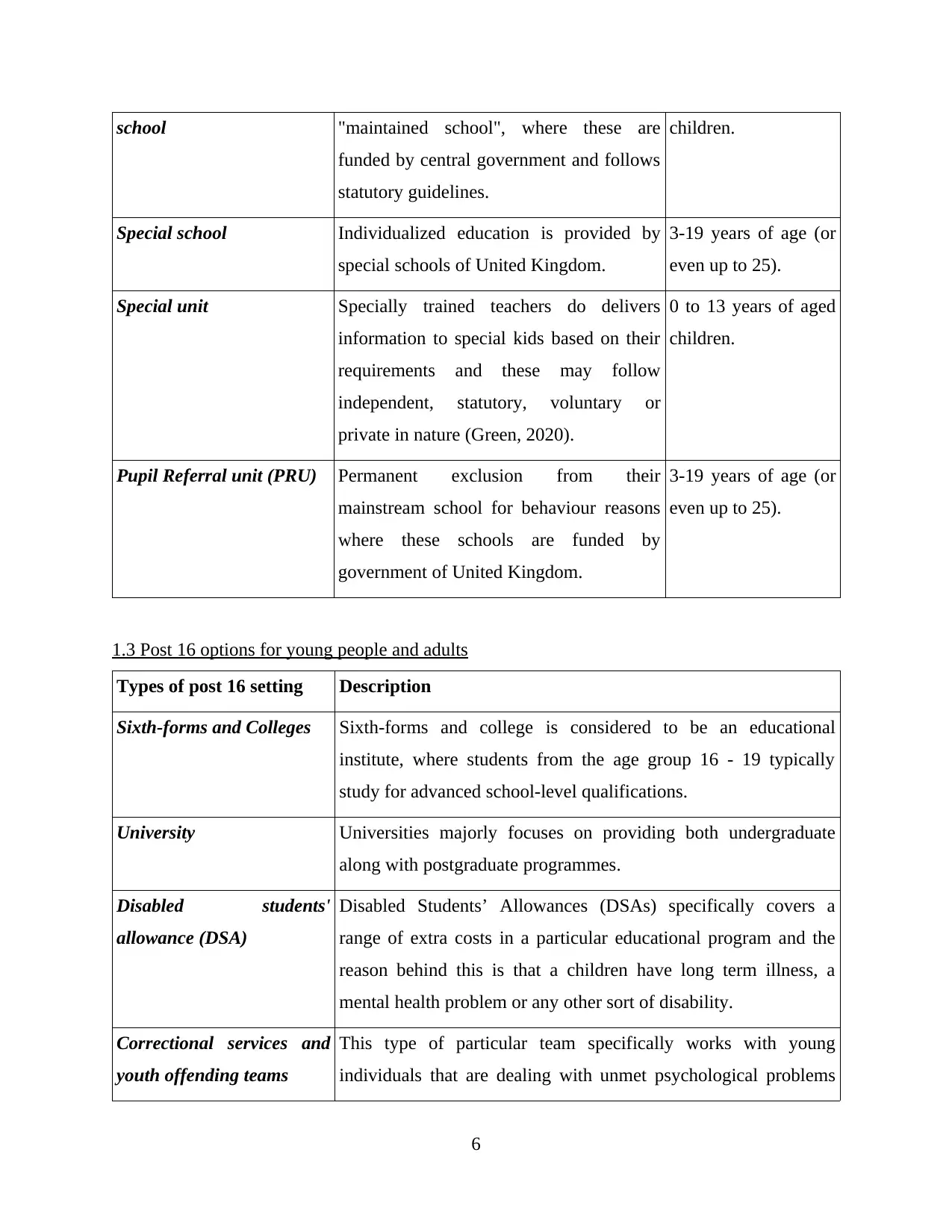
school "maintained school", where these are
funded by central government and follows
statutory guidelines.
children.
Special school Individualized education is provided by
special schools of United Kingdom.
3-19 years of age (or
even up to 25).
Special unit Specially trained teachers do delivers
information to special kids based on their
requirements and these may follow
independent, statutory, voluntary or
private in nature (Green, 2020).
0 to 13 years of aged
children.
Pupil Referral unit (PRU) Permanent exclusion from their
mainstream school for behaviour reasons
where these schools are funded by
government of United Kingdom.
3-19 years of age (or
even up to 25).
1.3 Post 16 options for young people and adults
Types of post 16 setting Description
Sixth-forms and Colleges Sixth-forms and college is considered to be an educational
institute, where students from the age group 16 - 19 typically
study for advanced school-level qualifications.
University Universities majorly focuses on providing both undergraduate
along with postgraduate programmes.
Disabled students'
allowance (DSA)
Disabled Students’ Allowances (DSAs) specifically covers a
range of extra costs in a particular educational program and the
reason behind this is that a children have long term illness, a
mental health problem or any other sort of disability.
Correctional services and
youth offending teams
This type of particular team specifically works with young
individuals that are dealing with unmet psychological problems
6
funded by central government and follows
statutory guidelines.
children.
Special school Individualized education is provided by
special schools of United Kingdom.
3-19 years of age (or
even up to 25).
Special unit Specially trained teachers do delivers
information to special kids based on their
requirements and these may follow
independent, statutory, voluntary or
private in nature (Green, 2020).
0 to 13 years of aged
children.
Pupil Referral unit (PRU) Permanent exclusion from their
mainstream school for behaviour reasons
where these schools are funded by
government of United Kingdom.
3-19 years of age (or
even up to 25).
1.3 Post 16 options for young people and adults
Types of post 16 setting Description
Sixth-forms and Colleges Sixth-forms and college is considered to be an educational
institute, where students from the age group 16 - 19 typically
study for advanced school-level qualifications.
University Universities majorly focuses on providing both undergraduate
along with postgraduate programmes.
Disabled students'
allowance (DSA)
Disabled Students’ Allowances (DSAs) specifically covers a
range of extra costs in a particular educational program and the
reason behind this is that a children have long term illness, a
mental health problem or any other sort of disability.
Correctional services and
youth offending teams
This type of particular team specifically works with young
individuals that are dealing with unmet psychological problems
6
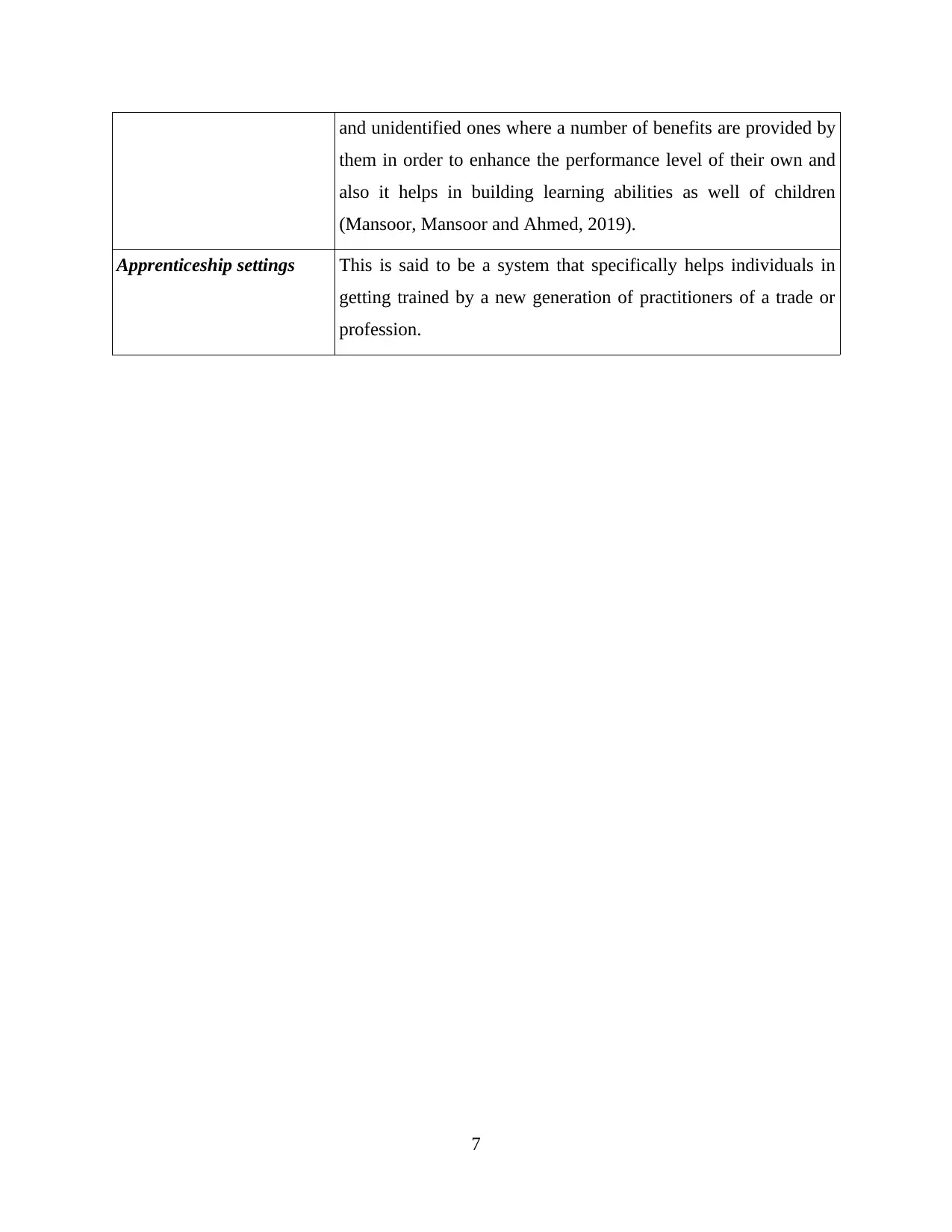
and unidentified ones where a number of benefits are provided by
them in order to enhance the performance level of their own and
also it helps in building learning abilities as well of children
(Mansoor, Mansoor and Ahmed, 2019).
Apprenticeship settings This is said to be a system that specifically helps individuals in
getting trained by a new generation of practitioners of a trade or
profession.
7
them in order to enhance the performance level of their own and
also it helps in building learning abilities as well of children
(Mansoor, Mansoor and Ahmed, 2019).
Apprenticeship settings This is said to be a system that specifically helps individuals in
getting trained by a new generation of practitioners of a trade or
profession.
7
⊘ This is a preview!⊘
Do you want full access?
Subscribe today to unlock all pages.

Trusted by 1+ million students worldwide
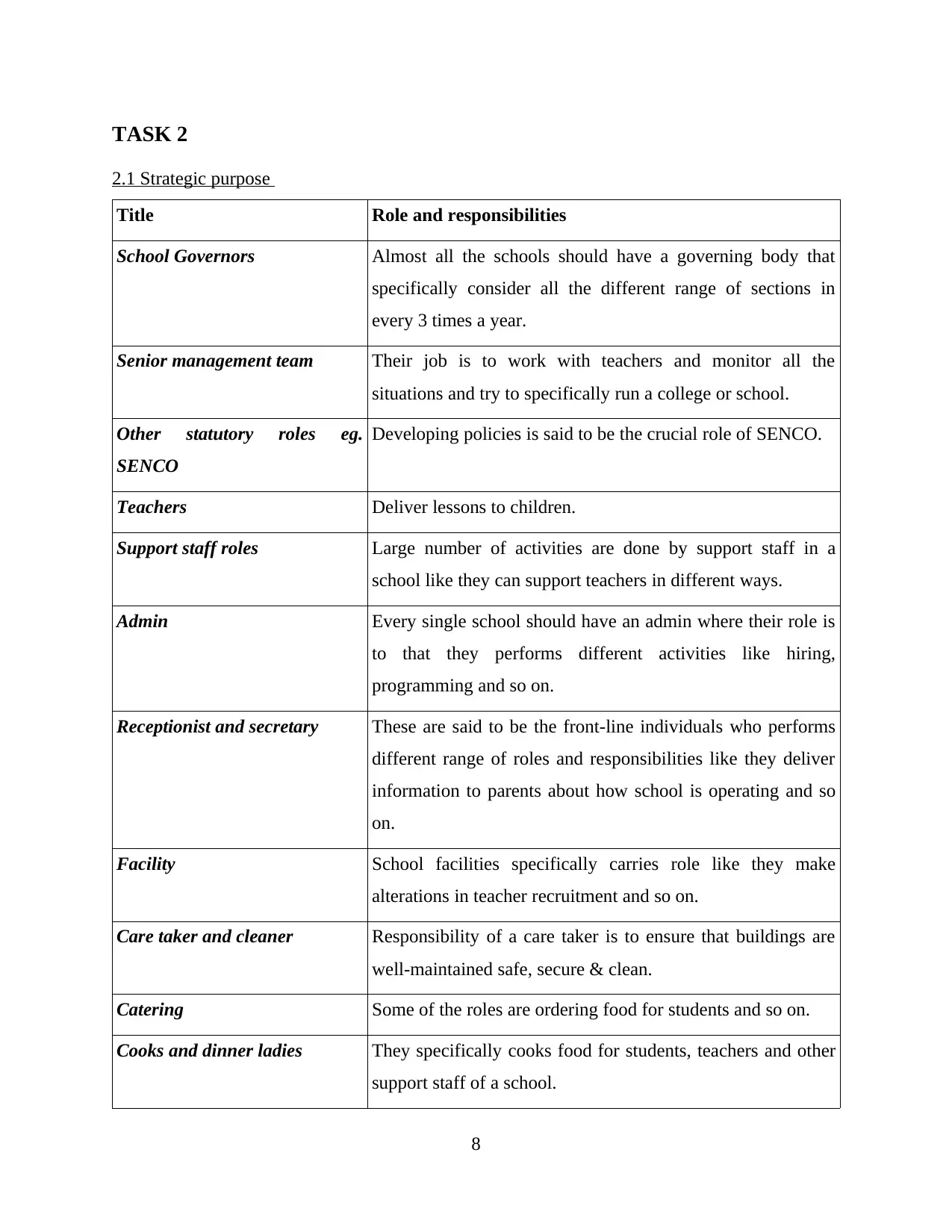
TASK 2
2.1 Strategic purpose
Title Role and responsibilities
School Governors Almost all the schools should have a governing body that
specifically consider all the different range of sections in
every 3 times a year.
Senior management team Their job is to work with teachers and monitor all the
situations and try to specifically run a college or school.
Other statutory roles eg.
SENCO
Developing policies is said to be the crucial role of SENCO.
Teachers Deliver lessons to children.
Support staff roles Large number of activities are done by support staff in a
school like they can support teachers in different ways.
Admin Every single school should have an admin where their role is
to that they performs different activities like hiring,
programming and so on.
Receptionist and secretary These are said to be the front-line individuals who performs
different range of roles and responsibilities like they deliver
information to parents about how school is operating and so
on.
Facility School facilities specifically carries role like they make
alterations in teacher recruitment and so on.
Care taker and cleaner Responsibility of a care taker is to ensure that buildings are
well-maintained safe, secure & clean.
Catering Some of the roles are ordering food for students and so on.
Cooks and dinner ladies They specifically cooks food for students, teachers and other
support staff of a school.
8
2.1 Strategic purpose
Title Role and responsibilities
School Governors Almost all the schools should have a governing body that
specifically consider all the different range of sections in
every 3 times a year.
Senior management team Their job is to work with teachers and monitor all the
situations and try to specifically run a college or school.
Other statutory roles eg.
SENCO
Developing policies is said to be the crucial role of SENCO.
Teachers Deliver lessons to children.
Support staff roles Large number of activities are done by support staff in a
school like they can support teachers in different ways.
Admin Every single school should have an admin where their role is
to that they performs different activities like hiring,
programming and so on.
Receptionist and secretary These are said to be the front-line individuals who performs
different range of roles and responsibilities like they deliver
information to parents about how school is operating and so
on.
Facility School facilities specifically carries role like they make
alterations in teacher recruitment and so on.
Care taker and cleaner Responsibility of a care taker is to ensure that buildings are
well-maintained safe, secure & clean.
Catering Some of the roles are ordering food for students and so on.
Cooks and dinner ladies They specifically cooks food for students, teachers and other
support staff of a school.
8
Paraphrase This Document
Need a fresh take? Get an instant paraphrase of this document with our AI Paraphraser
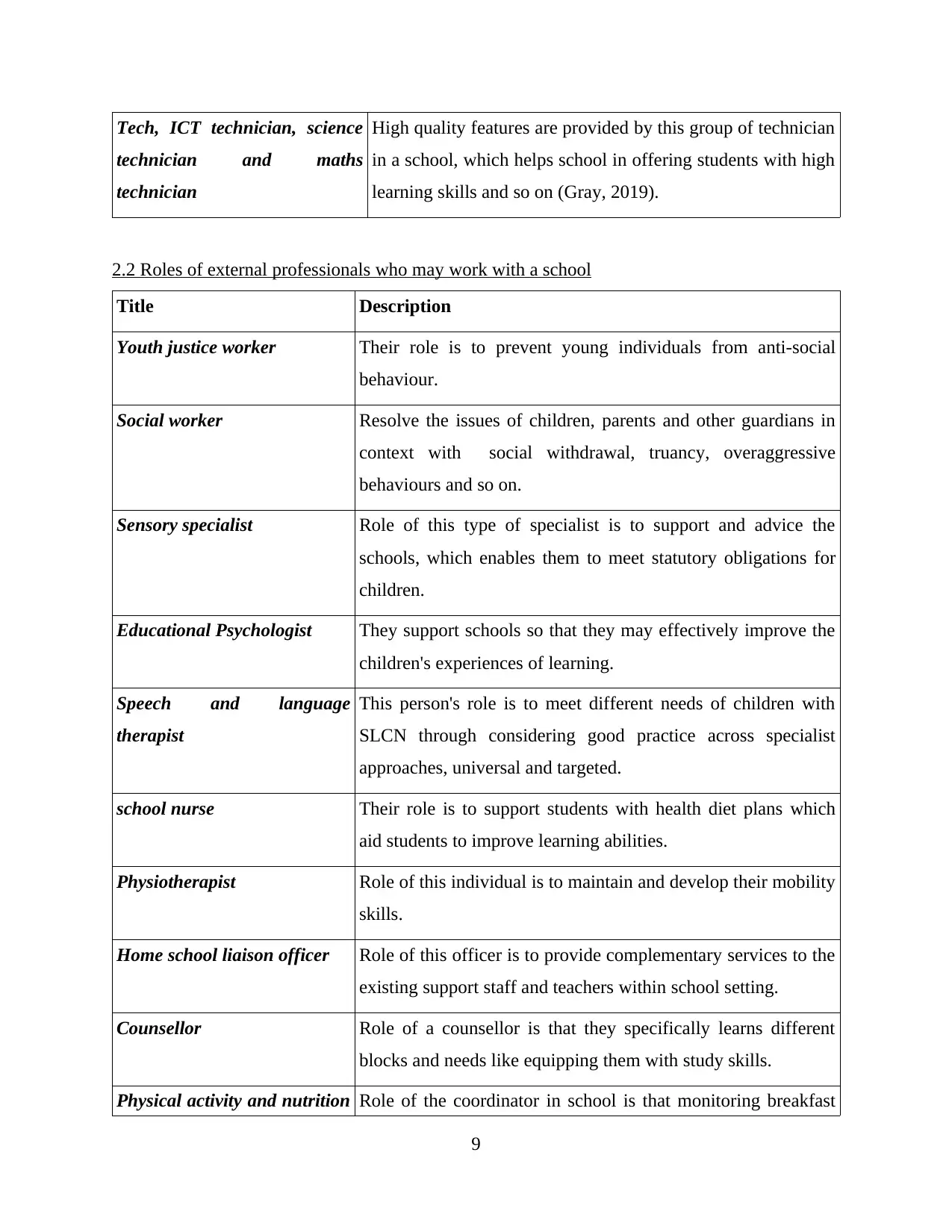
Tech, ICT technician, science
technician and maths
technician
High quality features are provided by this group of technician
in a school, which helps school in offering students with high
learning skills and so on (Gray, 2019).
2.2 Roles of external professionals who may work with a school
Title Description
Youth justice worker Their role is to prevent young individuals from anti-social
behaviour.
Social worker Resolve the issues of children, parents and other guardians in
context with social withdrawal, truancy, overaggressive
behaviours and so on.
Sensory specialist Role of this type of specialist is to support and advice the
schools, which enables them to meet statutory obligations for
children.
Educational Psychologist They support schools so that they may effectively improve the
children's experiences of learning.
Speech and language
therapist
This person's role is to meet different needs of children with
SLCN through considering good practice across specialist
approaches, universal and targeted.
school nurse Their role is to support students with health diet plans which
aid students to improve learning abilities.
Physiotherapist Role of this individual is to maintain and develop their mobility
skills.
Home school liaison officer Role of this officer is to provide complementary services to the
existing support staff and teachers within school setting.
Counsellor Role of a counsellor is that they specifically learns different
blocks and needs like equipping them with study skills.
Physical activity and nutrition Role of the coordinator in school is that monitoring breakfast
9
technician and maths
technician
High quality features are provided by this group of technician
in a school, which helps school in offering students with high
learning skills and so on (Gray, 2019).
2.2 Roles of external professionals who may work with a school
Title Description
Youth justice worker Their role is to prevent young individuals from anti-social
behaviour.
Social worker Resolve the issues of children, parents and other guardians in
context with social withdrawal, truancy, overaggressive
behaviours and so on.
Sensory specialist Role of this type of specialist is to support and advice the
schools, which enables them to meet statutory obligations for
children.
Educational Psychologist They support schools so that they may effectively improve the
children's experiences of learning.
Speech and language
therapist
This person's role is to meet different needs of children with
SLCN through considering good practice across specialist
approaches, universal and targeted.
school nurse Their role is to support students with health diet plans which
aid students to improve learning abilities.
Physiotherapist Role of this individual is to maintain and develop their mobility
skills.
Home school liaison officer Role of this officer is to provide complementary services to the
existing support staff and teachers within school setting.
Counsellor Role of a counsellor is that they specifically learns different
blocks and needs like equipping them with study skills.
Physical activity and nutrition Role of the coordinator in school is that monitoring breakfast
9
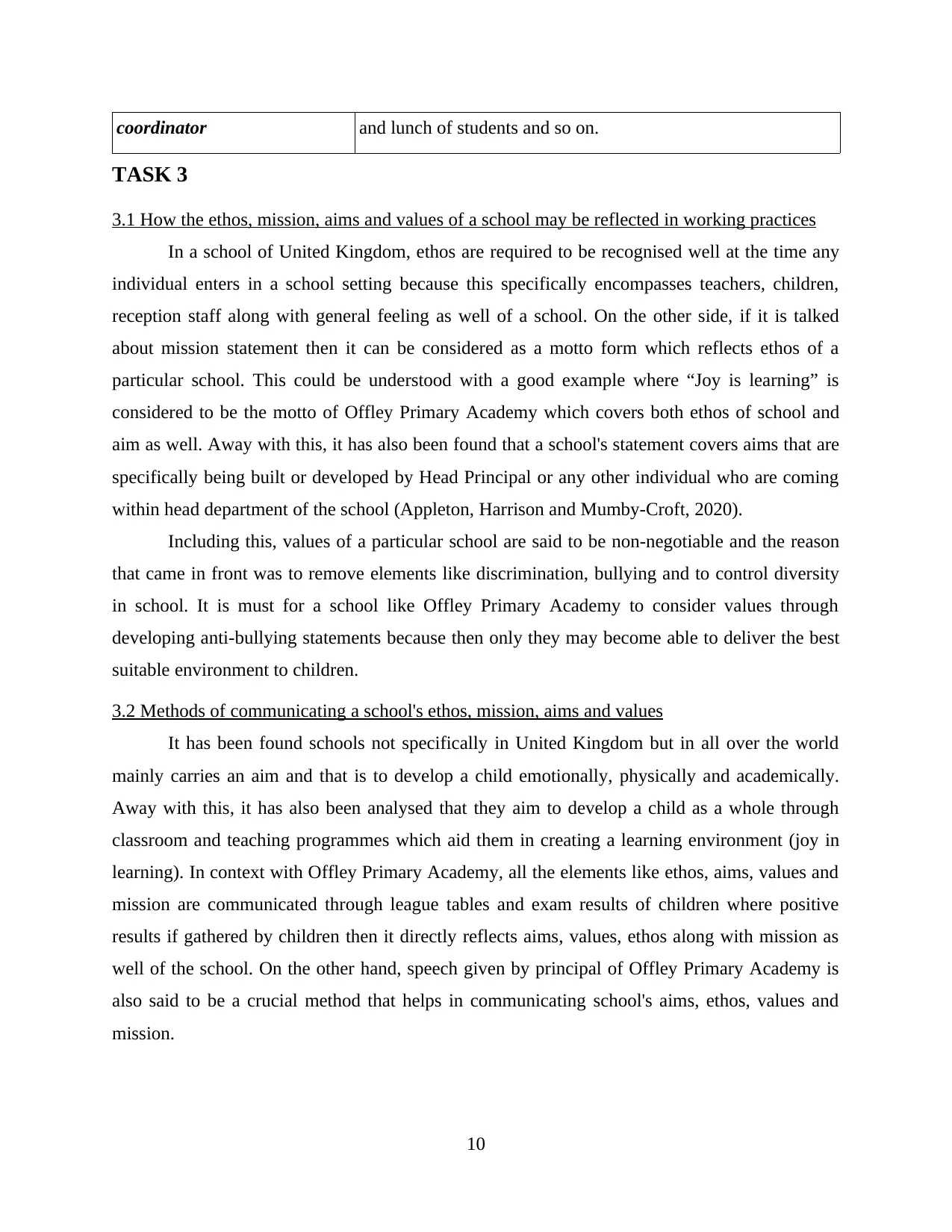
coordinator and lunch of students and so on.
TASK 3
3.1 How the ethos, mission, aims and values of a school may be reflected in working practices
In a school of United Kingdom, ethos are required to be recognised well at the time any
individual enters in a school setting because this specifically encompasses teachers, children,
reception staff along with general feeling as well of a school. On the other side, if it is talked
about mission statement then it can be considered as a motto form which reflects ethos of a
particular school. This could be understood with a good example where “Joy is learning” is
considered to be the motto of Offley Primary Academy which covers both ethos of school and
aim as well. Away with this, it has also been found that a school's statement covers aims that are
specifically being built or developed by Head Principal or any other individual who are coming
within head department of the school (Appleton, Harrison and Mumby-Croft, 2020).
Including this, values of a particular school are said to be non-negotiable and the reason
that came in front was to remove elements like discrimination, bullying and to control diversity
in school. It is must for a school like Offley Primary Academy to consider values through
developing anti-bullying statements because then only they may become able to deliver the best
suitable environment to children.
3.2 Methods of communicating a school's ethos, mission, aims and values
It has been found schools not specifically in United Kingdom but in all over the world
mainly carries an aim and that is to develop a child emotionally, physically and academically.
Away with this, it has also been analysed that they aim to develop a child as a whole through
classroom and teaching programmes which aid them in creating a learning environment (joy in
learning). In context with Offley Primary Academy, all the elements like ethos, aims, values and
mission are communicated through league tables and exam results of children where positive
results if gathered by children then it directly reflects aims, values, ethos along with mission as
well of the school. On the other hand, speech given by principal of Offley Primary Academy is
also said to be a crucial method that helps in communicating school's aims, ethos, values and
mission.
10
TASK 3
3.1 How the ethos, mission, aims and values of a school may be reflected in working practices
In a school of United Kingdom, ethos are required to be recognised well at the time any
individual enters in a school setting because this specifically encompasses teachers, children,
reception staff along with general feeling as well of a school. On the other side, if it is talked
about mission statement then it can be considered as a motto form which reflects ethos of a
particular school. This could be understood with a good example where “Joy is learning” is
considered to be the motto of Offley Primary Academy which covers both ethos of school and
aim as well. Away with this, it has also been found that a school's statement covers aims that are
specifically being built or developed by Head Principal or any other individual who are coming
within head department of the school (Appleton, Harrison and Mumby-Croft, 2020).
Including this, values of a particular school are said to be non-negotiable and the reason
that came in front was to remove elements like discrimination, bullying and to control diversity
in school. It is must for a school like Offley Primary Academy to consider values through
developing anti-bullying statements because then only they may become able to deliver the best
suitable environment to children.
3.2 Methods of communicating a school's ethos, mission, aims and values
It has been found schools not specifically in United Kingdom but in all over the world
mainly carries an aim and that is to develop a child emotionally, physically and academically.
Away with this, it has also been analysed that they aim to develop a child as a whole through
classroom and teaching programmes which aid them in creating a learning environment (joy in
learning). In context with Offley Primary Academy, all the elements like ethos, aims, values and
mission are communicated through league tables and exam results of children where positive
results if gathered by children then it directly reflects aims, values, ethos along with mission as
well of the school. On the other hand, speech given by principal of Offley Primary Academy is
also said to be a crucial method that helps in communicating school's aims, ethos, values and
mission.
10
⊘ This is a preview!⊘
Do you want full access?
Subscribe today to unlock all pages.

Trusted by 1+ million students worldwide
1 out of 18
Related Documents
Your All-in-One AI-Powered Toolkit for Academic Success.
+13062052269
info@desklib.com
Available 24*7 on WhatsApp / Email
![[object Object]](/_next/static/media/star-bottom.7253800d.svg)
Unlock your academic potential
Copyright © 2020–2026 A2Z Services. All Rights Reserved. Developed and managed by ZUCOL.





